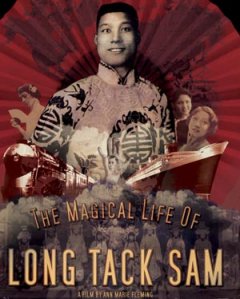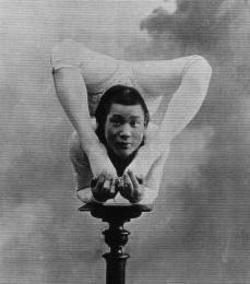Cinequest
2004:
The Magical Life of Long Tack Sam

How much
do you know about your great-grandfather? I only know that
he was a hard working field hand who moved to Santa Cruz and
promptly died. My great-grandfather wasn't a world-renowned
magician, nor was he a globe-trotting Chinese man who traveled
the world as an acrobat and taught magic to folks like Orson
Welles and Laurel and Hardy.
Ann Marie
Fleming's great-grandfather did, and she didn't seem to know
much more about her ancestor than I did mine. The Magical
Life of Long Tack Sam documents her world-wide travels
to find out everything there is to know about one of the most
important magicians and acrobats in history.
Born
in China, Long Tack Sam began to study the art of necromancy
from an early age. Either impressed with a touring magician
or trained at whip's end by his brother, Long Tack Sam quickly
became one of the best-known performers around the world.
Touring from the US to Europe, back to China, then to Canada,
Hong Kong, Austria, Australia and the US again, Long Tack
Sam thrilled audiences with his show which incorporated traditional
Chinese acrobatics with more western-style magic and singing.
Even
more interesting than the tales of his act are the tales of
his family. Sam married Poldi, an Austrian, after meeting
her in a shop in the early years of the 1900s. The two had
three children over the years, two of which became famous
world-wide for performing in their father's shows.
There
are interviews with Sam's children, grandchildren, and a few
of his great-grandchildren. This group is shown, each of them
with their profession attached to their name. Sam's descendants
include musicians, a dentist, a filmmaker, dancers, and a
bunch more. It becomes obvious that this is no ordinary family.
 The strength of the film lies in two things: the fact that
Fleming is an animator and that there was no accessible footage
of Long Tack Sam's act. This allowed Fleming to reenact his
show, and many events of Sam's life, by animating still photos.
At worst, this technique can produce results similar to those
that Terry Gilliam used in old Monty Python bumpers. At best,
you get a multi-layered feel as the makers of The Kid Stays
in the Picture achieved. This certainly falls towards
the latter, as even though you never saw Sam doing his signature
stunts, you left the theatre being able to describe them perfectly.
It works particularly well when illustrating the classic needle
trick, a trick that had been Sam's trademark that was eventually
stolen from him by Houdini. There is also traditional animation,
which works wonderfully to move the story along.
The strength of the film lies in two things: the fact that
Fleming is an animator and that there was no accessible footage
of Long Tack Sam's act. This allowed Fleming to reenact his
show, and many events of Sam's life, by animating still photos.
At worst, this technique can produce results similar to those
that Terry Gilliam used in old Monty Python bumpers. At best,
you get a multi-layered feel as the makers of The Kid Stays
in the Picture achieved. This certainly falls towards
the latter, as even though you never saw Sam doing his signature
stunts, you left the theatre being able to describe them perfectly.
It works particularly well when illustrating the classic needle
trick, a trick that had been Sam's trademark that was eventually
stolen from him by Houdini. There is also traditional animation,
which works wonderfully to move the story along.
The film
examines the origins of the Long Tack Sam mythos in a series
of comic book styled scenes. There are three different versions
of the story, all of which seem to come from reliable sources.
The visual impression they leave is fantastic, and Ann Marie
even had a comic book produced for the film which tells the
most realistic story.
There
is a slight problem with the focus. It's either a film about
her travels to find her great-grandfather's story, or it's
her great-grandfather's story. It's not always clear. Even
with those problems, the style and the visual impact is enough
to bring Long Tack Sam to a level that few documentaries
achieve in the area of audience appreciation.
|

 The strength of the film lies in two things: the fact that
Fleming is an animator and that there was no accessible footage
of Long Tack Sam's act. This allowed Fleming to reenact his
show, and many events of Sam's life, by animating still photos.
At worst, this technique can produce results similar to those
that Terry Gilliam used in old Monty Python bumpers. At best,
you get a multi-layered feel as the makers of The Kid Stays
in the Picture achieved. This certainly falls towards
the latter, as even though you never saw Sam doing his signature
stunts, you left the theatre being able to describe them perfectly.
It works particularly well when illustrating the classic needle
trick, a trick that had been Sam's trademark that was eventually
stolen from him by Houdini. There is also traditional animation,
which works wonderfully to move the story along.
The strength of the film lies in two things: the fact that
Fleming is an animator and that there was no accessible footage
of Long Tack Sam's act. This allowed Fleming to reenact his
show, and many events of Sam's life, by animating still photos.
At worst, this technique can produce results similar to those
that Terry Gilliam used in old Monty Python bumpers. At best,
you get a multi-layered feel as the makers of The Kid Stays
in the Picture achieved. This certainly falls towards
the latter, as even though you never saw Sam doing his signature
stunts, you left the theatre being able to describe them perfectly.
It works particularly well when illustrating the classic needle
trick, a trick that had been Sam's trademark that was eventually
stolen from him by Houdini. There is also traditional animation,
which works wonderfully to move the story along.





